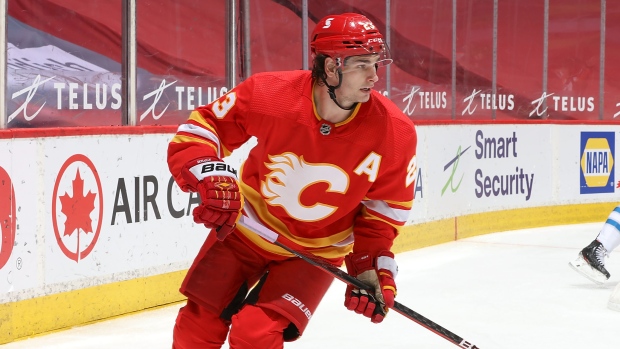Mar 24, 2022
Flames’ culture of accountability could leave veterans as healthy scratches
Longtime Calgary centre Sean Monahan appears to be on the outside looking in as Flames prepare to face Coyotes, Salim Valji writes.
By Salim Valji

There was a time in the not-so-distant past when Calgary Flames players who were healthy scratches would sometimes elect not to skate on optional practice days, and a place in the lineup was given rather than earned.
In the 13 months since getting rehired by the franchise, head coach Darryl Sutter has sought to upend that culture into one of accountability, while general manager Brad Treliving has provided him with roster pieces to support that culture.
With the additions of Tyler Toffoli, Calle Jarnkrok, and, more recently, Ryan Carpenter, the Flames look like one of the deepest forward groups in the league, which might lead to respected veterans finding themselves on the sidelines.
Carpenter, billed as a defensively-responsible depth forward who can kill penalties, was skating on a line with Milan Lucic and Brett Ritchie at Thursday’s practice. Longtime Flame Sean Monahan and veteran Trevor Lewis were the extras ahead of tomorrow’s tilt versus the Arizona Coyotes.
Monahan was once a franchise centre, but could find himself on the outside of the lineup looking in. He has spent almost the whole season on the fourth line and has eight goals and 22 points in 63 games while going pointless in his past 14. Monahan started his Flames career by scoring 20 or more goals in seven consecutive seasons and is eighth in franchise history with 212 goals.
After the Toffoli acquisition, Monahan was bumped off the top power-play unit and has not seen any ice time on the man advantage the past two games. If he is out on Friday, it would be the first healthy scratch of Monahan’s nine-season career. Monahan was not made available to reporters on Thursday.
“Not the season he would like to have,” assistant coach Ryan Huska said. “He’s used to scoring goals, which is what he’s done in the time that he’s been here.”
Huska praised Monahan’s willingness to accept a different role after several seasons on the team’s top line alongside star Johnny Gaudreau.
“He’s been challenged in different ways from missing some power-play time and taken off the power play, he’s seen shifts up and down our lineup,” Huska said. “But that’s what we need. We need people to have different roles in order for us to have success. That’s what Sean is doing right now.”
Likely filling that fourth-line role is Carpenter, an American who was acquired from the Chicago Blackhawks at the trade deadline for a fifth-round pick in 2024. Carpenter was a part of Vegas’ run to the Cup final in their inaugural season and has 26 playoff games to his name.
“I know my skillset and my role in this league,” he said. “I know what I have to do to stay and contribute to a team.”
Carpenter grew up in Florida admiring former New York Rangers forward Ryan Callahan because of his grittiness and energy.
“There’s plenty of guys you try to emulate, but he’s one guy you saw that played hard every night,” Carpenter said.
Key to the Flames’ success this season has been checking, and not just in the physical sense. The Flames are 20th in the league in hits with 1,391, but that does fully explain their mentality in how they shut opponents down.
“Check, not defend,” Huska said. “Johnny Gaudreau defends differently than Milan Lucic, so there’s huge differences but they’re all expected to do the same thing.
“Where Milan is more of a physical presence, Johnny has to check with his feet, his stick, his angles, his head…Trevor Lewis a lot of the time checks with his mind by being in the right position, so he’s not even putting himself into battles because he’s always there before the puck gets there.”
Carpenter’s insertion into the Flames’ lineup strengthens a fourth line that has, at times, been ineffective. It also means an increase in competition, which permeates throughout the lineup and is a hallmark of the new culture.
“Part of us changing the culture is that there’s accountability in regards to how we need each individual to play and how we have to play as a team,” Huska said.
“[Competition is] a beautiful thing…you can see, even in the stuff after practice, there’s more guys hanging around to do a little more extra work. A lot of that comes down to them seeing the quality of players we have and wanting to make sure they’re ready to play when called upon so they’re never putting themselves in a situation where they might not be a part of it on a nightly basis.”

